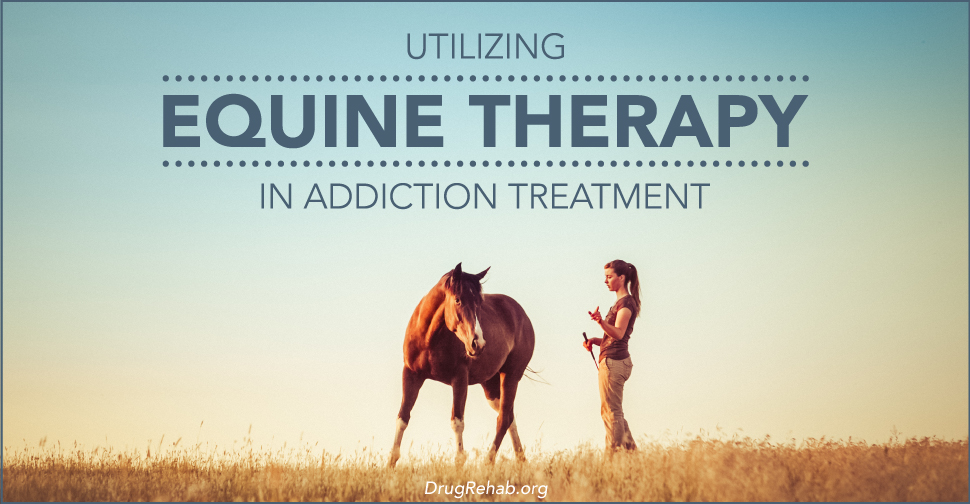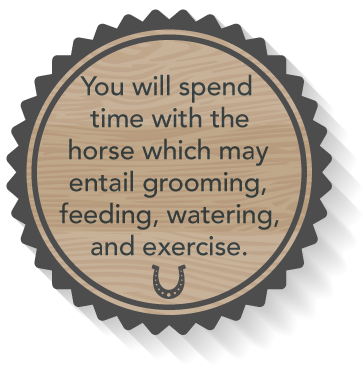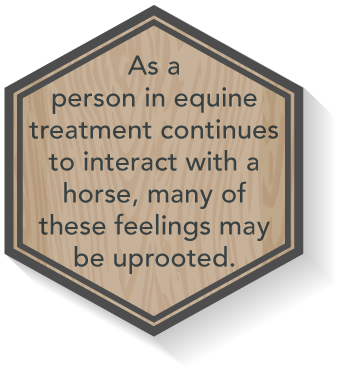
We are living in an exciting time within the realm of addiction treatment. Currently, continuous advances in treatment modalities are constantly upgrading and expanding the offerings of treatment facilities, granting individuals a diversity of therapies that work towards ensuring that every person with an addiction can find a program that best fulfills their needs. Equine therapy is one such avenue of treatment.
What Is Equine Therapy?
Equine therapy, or what is at times called equine-assisted psychotherapy, is a specific form of animal-assisted therapy relating to horses. This non-invasive therapeutic method has been used for numerous years as an effective treatment for those striving to recover from trauma, developmental disorders, or mental health concerns. In this instance, it is used in conjunction with other therapeutic methods within a comprehensive addiction treatment plan. It is not only for individuals who have experience with horsemanship—even if you’ve never seen a horse in real life, you will still be able to take part in this therapy.
 Though it may seem highly intimidating to work with an animal of this size, it is important to remember that every animal within the program has been carefully vetted and selected based on strict criteria. The animals you encounter will be gentle, calm, grounded, well-trained, and receptive, so that each person in treatment is not only protected, but more easily able to interact with each animal in a manner that is beneficial to their recovery.
Though it may seem highly intimidating to work with an animal of this size, it is important to remember that every animal within the program has been carefully vetted and selected based on strict criteria. The animals you encounter will be gentle, calm, grounded, well-trained, and receptive, so that each person in treatment is not only protected, but more easily able to interact with each animal in a manner that is beneficial to their recovery.
Despite what your first thought may be, in most cases, you may not actually ride the animal. Instead, under the supervision and guidance of someone trained in equine therapy, you will spend a significant amount of time with the horse, in close quarters, which will likely entail the basic necessities of care—grooming, feeding, watering, and exercise—which may take place in a ring or circular enclosure.
How Do The Horses Help?
People may be very receptive to this therapy because horses seem very unassuming, without expectations, agendas, or judgement, a perception that garners a person to let down their guard. Therapy horses have been compared to biofeedback machines, as noted by The Professional Association of Therapeutic Horsemanship International (PATH International), in the capacity that they may, at times, seem to mirror the behaviors or mindset of the individual in treatment.
Horses are intelligent, insightful, and by nature, gentle creatures. They are renowned for being very intuitive animals, that is to say that they’re known to pick up on and respond to a human’s state of mind and body language. One of the main reasons for this is that they are prey animals, meaning that in the wild, they are at risk of being preyed upon by a variety of predators, thus, for their own survival, they must be constantly alert and aware to their surroundings and the presence and bearing of other creatures. According to PATH International, this is because they use a specific part of their unique physical makeup, a vomeronasal organ, to sense or smell minute changes in a human’s physiological makeup which may be caused by an emotional disruption.

Due to this, it can be very hard to hide something from a horse. It is human nature to at times say one thing, while we are in fact feeling another. A horse’s enhanced senses can detect if you are fearful or apprehensive, if you are holding something back, or if your projected state does not align with your internal one. They will react to this, becoming wary, agitated, or dismissive.
One research paper titled “Equine Psychotherapy: Worth More than Just a Horse Laugh,” notes this, “Work with the horse requires cooperative affective and behavioral consistency in clients who have learned a habit of thinking one way, feeling otherwise, and behaving in a manner that may be totally unrelated to either.” They continue to say that “the horse seems to sense the incongruity and will display confusion until the client is internally consistent.” Thus, one of the most empowering aspects of this therapy is when the horse approaches you more confidently, signifying to some extent that your internal state more closely mirrors what you are externally resonating.
Helping You To Find Balance And Promote A Positive Self-Image
Oftentimes, a person in treatment will over analyze and internalize the situation, which can be counterproductive to progress. Doing something hands-on and physical is beneficial to counter this, as it draws you out of your head, especially when the activity involves an animal that is attuned to a person and will react to their actions.
Beyond the fact that spending time with animals has been shown to be soothing, calming, and influential in reducing stress, this time will help still your mind so that your thoughts can be more focused and proactive, instead of scattered and reactive.
Many times, as a person gives up greater amounts of their life, time, and even themselves to an addiction, they begin to lose sight of themselves, and become consumed by negative emotions. A harmful shift can occur, resulting in these detrimental mindsets taking the forefront of a person’s thoughts. These draining emotions and mindsets may include a sense of isolation or loneliness, a lack of self-worth or purpose, fear, weakness, and an inability to make decisions or communicate effectively.
As a person in equine treatment continues to interact with a horse, many of these feelings may be uprooted—it is a very powerful and grounding thing to be in part responsible for another being’s care. Instead of being hindered by the aforementioned negative emotions, you may begin to feel:
 A sense of connectedness
A sense of connectedness- Confidence, motivation, and focus
- Increased optimism
- Greater strength and resilience
- Awareness of boundaries
- Increased decision making skills as you take part in the necessities of caring for these great creatures
- Communication skills that are enhanced by the compelling displays of nonverbal communication that horses so powerfully embody
You will begin to feel needed, a profound sense of value that extends beyond your time in the ring. As you feel that the horse requires your care, you will increasingly understand the necessity of your own self-care.
Your time spent in equine therapy will also help to instill a greater sense of self-efficacy and increased coping skills, two things that will help you towards progress, both within treatment, and during the time after as you work towards maintaining your sobriety.

Society & Animals’ Journal of Human-Animal Studies published noteworthy results on this field and its impact on a person’s psyche, presented in an article called “The Effectiveness of Equine-Assisted Experiential Therapy: Results of an Open Clinical Trial,” which noted that individuals encountering this therapy had “fewer psychological symptoms and reductions in the intensity of their psychological distress.” They also reported that these people were:
- More oriented in the present
- Better able to live more fully in the here-and-now
- Less burdened by regrets, guilt, and resentments
- Less focused on fears related to the future
- More independent
- More self-supportive
All of these results have profound implications for an individual who is striving to obtain sobriety and maintain a successful and balanced recovery for the long term.
Benefit For Those With A Co-Occurring Disorder
Any good treatment program should not only have an awareness of the importance of co-occurring disorders within rehab, but of how to treat them. A co-occurring disorder is that which occurs alongside of the drug or alcohol addiction. What is dangerous about these dual diagnosis situations, is that if one disorder or condition is treated while the other is not, the latter can work towards the negative and threaten the success of the former.
For instance, if a person with an alcohol addiction who drank to suppress feelings of depression (a co-occurring disorder) finds sobriety, but does nothing to treat their depression, they may be tempted to self-medicate the symptoms of depression when they arise, which may lead them to relapse. The powerful thing about equine therapy is, as we’ve noted before, that it has numerous implications beyond addiction therapy, including other disorders that may co-occur with addiction, including trauma, depression, anxiety, borderline personality disorder, post traumatic stress disorder (PTSD), and others.
Therefore, when a person encounters equine therapy, set against a backdrop of other dynamic treatment modalities like behavioral therapies, they are more empowered to find success in battling not just an addiction, but their dual diagnosis, in turn increasing their odds for success.
Let Us Help You Experience This Gratifying Therapeutic Method
We want you to regain a sense of self, instilled with purpose and fulfillment that cannot be present within a life influenced by addiction. If equine therapy seems intriguing, please take the time to talk to one of our staff at DrugRehab.org, so that we share with you how this, and other modalities may work towards getting you the sobriety and better health that you deserve. Contact us today.

